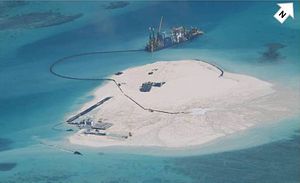Your weekly round-up of China-related links:
China Daily has a written interview with the director-general of the Department of Boundary and Ocean Affairs at the Foreign Minister, Ouyang Yujing. The interview quizzes Ouyang specifically about China’s construction activities in the Spratlys (called “Nansha” in Chinese and in the China Daily piece). The interview is the latest evidence that China is changing tactics and trying to be more open about its construction activities – while still holding firm to the government line.
Some takeaways: Ouyang says “the facilities on relevant islands and reefs are primarily for civilian purposes,” including “runway, pier, telecommunication, meteorological, navigation safety, and environmental observation facilities, etc.” Ouyang also dismisses the notion that China is using the construction to bolster its legal claims to the South China Sea: “This position has adequate historical and legal basis. There is no need to have it strengthened through construction activities on relevant islands and reefs.”
And most tellingly, Ouyang explains that China objects to other countries’ construction activities while conducting its own for a very simple reason: China is building facilities on its own islands; other countries are building on China’s islands. “The construction activities by China and those by these countries are totally different in nature. China urges the Philippines and other countries to immediately withdraw their personnel and facilities from the islands and reefs they have illegally occupied,” Ouyang said.
Meanwhile, just as Taiwan’s president revealed a South China Sea Peace Initiative for handling maritime disputes, Taiwan’s foreign minister, David Lin, told reporters that he believes Taiwan and the Philippines will sign an agreement on law enforcement in disputed areas “very soon, in the near future.” According to Kyodo News, Lin said that “both sides have agreed on the wording of the agreement.” The negotiations began after a Taiwanese fisherman was shot and killed by the Philippine Coast Guard in May 2013. The new agreement would see both sides promise to avoid the use of force in future encounters and to keep in contact as incidents arise. Though the agreement has yet to be signed, President Ma Ying-jeou said both sides were already acting according to the consensus, citing recent cases of peaceful encounters began Taiwanese fishing vessels and the Philippine Coast Guard.
Over at Asia Sentinel, Bill Hayton examines China’s historical claims to the South China Sea – and finds many of the historical arguments wanting. His conclusion: much of the scholarship (both in Chinese and in English) makes little or no reference to primary sources, compounding mistakes and deliberate distortions of history. According to Hayton, “the Chinese state’s interest in [the South China Sea islands] only dates from the 20th Century.”
In other news, the New York Times reports that China hosted “secret talks” between an Afghan official and former Taliban leaders last week. Pakistan officials helped organized the meeting, which was held in Urumqi from May 20-21. Mohammad Masoom Stanekzai, the new nominee for Afghan’s defense minister, represented Kabul. The three former Taliban officials were reportedly “Mullah Jalil, a former foreign minister; Mullah Abdul Razaq, a former interior minister; and Mullah Hassan Rahmani, a former governor of Kandahar Province.” Both the Afghan government and the Taliban were quick to say that they have not started peace talks – these discussions, unconfirmed by both sides, are likely a trust-building exercises as a precursor to talks.
Financial Times reports that JPMorgan has been ordered to provide the U.S. Securities and Exchange Commission with all its correspondence with top Chinese officials. JPMorgan is being investigated for allegedly hiring the relatives of Chinese officials to help improve its business prospects in China. Notably, the bank was ordered to turn over any communication with Wang Qishan, the head of China’s Central Commission for Discipline Inspection (CCDI) and thus the leader of the current anti-corruption campaign. In a possibly related move, a U.S. official told Financial Times that Wang was no longer discussing a future trip to the United States.
While China is celebrated at the BookExpo America (BEA) in New York City this week, PEN is using the event to draw attention to Chinese censorship. PEN has an interview with Perry Link, who famously coined the term “anaconda in the chandelier” to refer to the stifling effect of Chinese government censorship. Link and PEN look at why, among other things, an American book expo is featuring books promoting China’s territorial claims to the disputed Senkaku/Diaoyu Islands and seeking to promote Chinese “education in patriotism.”

































